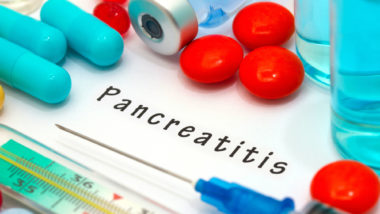 Patients taking SGLT2 inhibitors to control diabetes should be aware of Fournier gangrene symptoms.
Patients taking SGLT2 inhibitors to control diabetes should be aware of Fournier gangrene symptoms.
Fournier gangrene is a rare flesh-eating bacteria that most often starts in the genital area. Before SGLT2 inhibitors were formulated, there had only been six cases of the potentially fatal infection between the years 1983 and 2013.
SGLT2 inhibitors are available by prescription to help control blood sugar levels in people with type 2 diabetes. These diabetes medicines work by routing excess sugar (glucose) out of the bloodstream. Instead, the excess sugar goes through the kidneys and is excreted through urine.
Last year, the FDA reported receiving 12 notifications of the flesh-eating bacteria between March 2013 and May 2018. Invokana was the first SGLT2 inhibitor approved by the FDA in March 2013.
The FDA now has identified 55 cases of Fournier gangrene among patients taking SGLT2 inhibitors between March 2013 and January 2019. Of these cases, 39 were men, and 16 were women. The onset of the infection took anywhere from 5 days to 49 months after initiating treatment with an SGLT2 inhibitor.
According to WebMD, the following SLGT inhibitors apparently influenced the development of Fournier gangrene among patients:
- Canagliflozin (Invokana), 21 patients
- Dapagliflozin (Farxiga), 16 patients
- Empagliflozin (Jardiance), 18 patients
The only SGLT2 inhibitor not associated with the infection was Steglatro, generically known as ertugliflozin. The FDA speculates that the reason Steglatro was left out was because it was the latest SGLT2 inhibitor to be approved (December 2017).
Watch for Fournier Gangrene Symptoms
The term gangrene refers to bodily tissue that dies. Fournier gangrene specifically refers to infection in the genitals or in the perineum, which is the area between the genitals and the anus.
Fournier gangrene is a fast-spreading flesh-eating bacteria that must be treated with IV antibiotics and surgery to remove the dead and dying tissue, which will be sent to a lab for confirmation of the diagnosis.
According to WebMD, urinary tract infections, bladder infections, abscesses and post-surgical infections from hysterectomies can all lead to Fournier gangrene. Symptoms can include fever, pain or swelling in the genitals or anal area, bad odor emanating from affected tissue, crackling sound upon touching the affected skin, dehydration and anemia.
Dr. Ahmet Selcuk Can, MD, an adjunct assistant clinical professor at Arnot Ogden Medical Center in Elmira, N.Y., told WebMD that because SGLT2 inhibitors route excess sugar out the urinary tract, this course of action could raise the risk of Fournier gangrene.
He said that bacteria and fungal organisms feed on sugar. In addition, the genital and anal area is contaminated with fecal matter that harbors bacteria. The environmental factors could encourage the development of Fournier gangrene, Dr. Can suggested.
Other factors that can increase the risk of Fournier gangrene include alcoholism, steroids, chemotherapy, HIV, obesity, cirrhosis of the liver and trauma to the genital area.
In 90 percent of the cases, physicians are able to trace the cause of Fournier gangrene.
According to the Post Graduate Medical Journal, Fournier gangrene symptoms must be taken seriously and medical help sought immediately. The flesh-eating bacteria can spread rapidly and result in multiple organ failure and death if not treated early.
Join a Free Diabetes Medications & Flesh-Eating Infection Lawsuit Investigation
The type-2 diabetes medications linked to the flesh-eating infection include:
- Invokana
- Invokamet/Invokamet XR
- Farxiga
- Xigduo XR
- Qtern
- Jardiance
- Glyxambi
- Synjardy/Synjardy XR
- Steglato
- Segluromet
- Steglujan
ATTORNEY ADVERTISING
Top Class Actions is a Proud Member of the American Bar Association
LEGAL INFORMATION IS NOT LEGAL ADVICE
Top Class Actions Legal Statement
©2008 – 2026 Top Class Actions® LLC
Various Trademarks held by their respective owners
This website is not intended for viewing or usage by European Union citizens.
E-mail any problems with this form to:
[email protected].
Oops! We could not locate your form.












